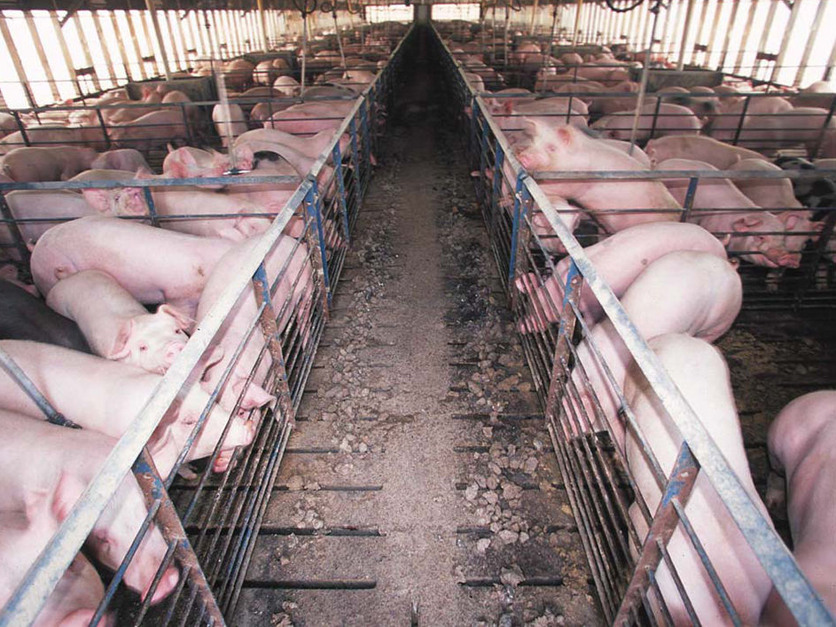Producers in the nation's number one hog producing state are facing multiple challenges to continued expansion, but so far they appear to be winning.
The latest victory for the industry involves a simple lack of action by the Iowa Legislature on bills to impose a moratorium on new or expanded confined feeding operations with more than 300 hogs. The moratorium proposal did not make it past the “first funnel” for legislation – meaning it was not acted upon by last Friday, and is considered dead for now.
But environmental groups in the state and beyond said they are encouraged by opposition to future confined feeding operations from nearly two dozen counties in the state, and they will continue to push for the legislation to be reintroduced and keep fighting individual applications for confined feeding operations, such as one by Iowa Select in Humboldt County.
“I would say they’re winning because of the money” they’ve invested in the political process, said Jess Mazour, farm and environment organizer at Iowa Citizens for Community Improvement. “We are winning in the court of public opinion.”
Iowa Pork Producers Association (IPPA) spokesman Ron Birkenholz said “the drumbeat is louder” this year, but also said the industry is adequately regulated.
“The moratorium legislation did not make it past the first funnel (because it wasn't passed out of subcommittee),” Food & Water Watch National Factory Farm Campaigner Krissy Kasserman said in an email. “House and Senate leadership can still call it back up so that's what we're advocating for now.”
Pork industry advocates did not seem too concerned about the effort, even before the moratorium legislation failed to advance. Eldon McAfee, an attorney with Brick Gentry in West Des Moines and legal counsel for the Iowa Pork Producers Association (IPPA), said before the first funnel arrived that he was “99.9 percent sure” that the bills wouldn’t make it. “As far as any legislation goes for the year, it would no longer be viable.”

Eldon McAfee
McAfee said a moratorium was “unwarranted and would be devastating to the agricultural economy, for sure, and would have a big effect on the Iowa economy in general.”
Also ahead of the funnel date, Birkenholz said the pork industry is “an easy target” when it comes to determining causes of pollution in the state.
“The industry has shown decades of continuous improvement,” he said. Manure generated by hog operations is “productively used,” he said. “Animal manure is an organic fertilizer. It’s not waste, it’s a valuable commodity.”
Complaints about odor from hog operations are “overstated as well,” he said. “There are times when there’s some odor, but not 24-7, 365 days a year.” And pork producers are “continually working on ways to reduce odor.”
But Food & Water Watch, a national environmental group, and dozens of state-based groups, such as Iowa Citizens for Community Improvement (CCI), point to an Iowa Department of Natural Resources report on water pollution last year that showed 750 of the state’s waters – more than half of those tested – are impaired.
“The data show that the vast majority of polluted streams are impaired by pollutants and conditions associated with factory farms, including E. coli, excessive algal growth and diminished aquatic life,” Kasserman said.
Birkenholz, however, says that siting plans, including manure management plans, are carefully reviewed before installations are constructed.
One part of the review involves a Master Matrix adopted by most counties in the state to score applications, and, if they choose, recommend their denial to DNR. CCI noted that 89 of the state’s 99 counties have passed resolutions allowing them to use the matrix.
CCI also is urging counties to pass resolutions calling for a moratorium on future hog operations or for local control over their siting.
Twenty-two counties – nearly a quarter of the counties in the state – have passed such resolutions so far, and Mazour said she expects the number to grow.
The effort is “starting to gain momentum,” she said. “I think there will be a lot more counties” passing resolutions.
Meanwhile, CCI has been fighting Iowa Select’s effort to site a facility in Humboldt County, after the company – the largest pork producer in Iowa – recently withdrew applications for facilities in Wayne, Clay and Hardin counties.
Humboldt County had recommended DNR deny the application, but DNR approved it in January, leading the county to appeal the decision to the governor-appointed, nine-member Environmental Protection Commission.
The EPC heard the case Tuesday, but did not take any action after new information surfaced that a business was located nearby, dropping the Master Matrix score below the level needed for the facility’s approval, Mazour said.
The EPC adjourned its meeting after taking two votes. A motion to table the matter failed, and a motion to approve the permit failed to gain the five votes necessary for approval by the EPC. But EPC staff person Jerah Sheets told Agri-Pulse after the meeting that because the commission took no action, the draft permit would remain in effect and be finalized and issued.
For more news, go to: www.Agri-Pulse.com


![Steve headshot 250x200[1]](http://www.agri-pulse.com/ext/resources/Headshots/Staff-Photos/thumb/Steve_Headshot_250x200[1].JPG?1738947158)